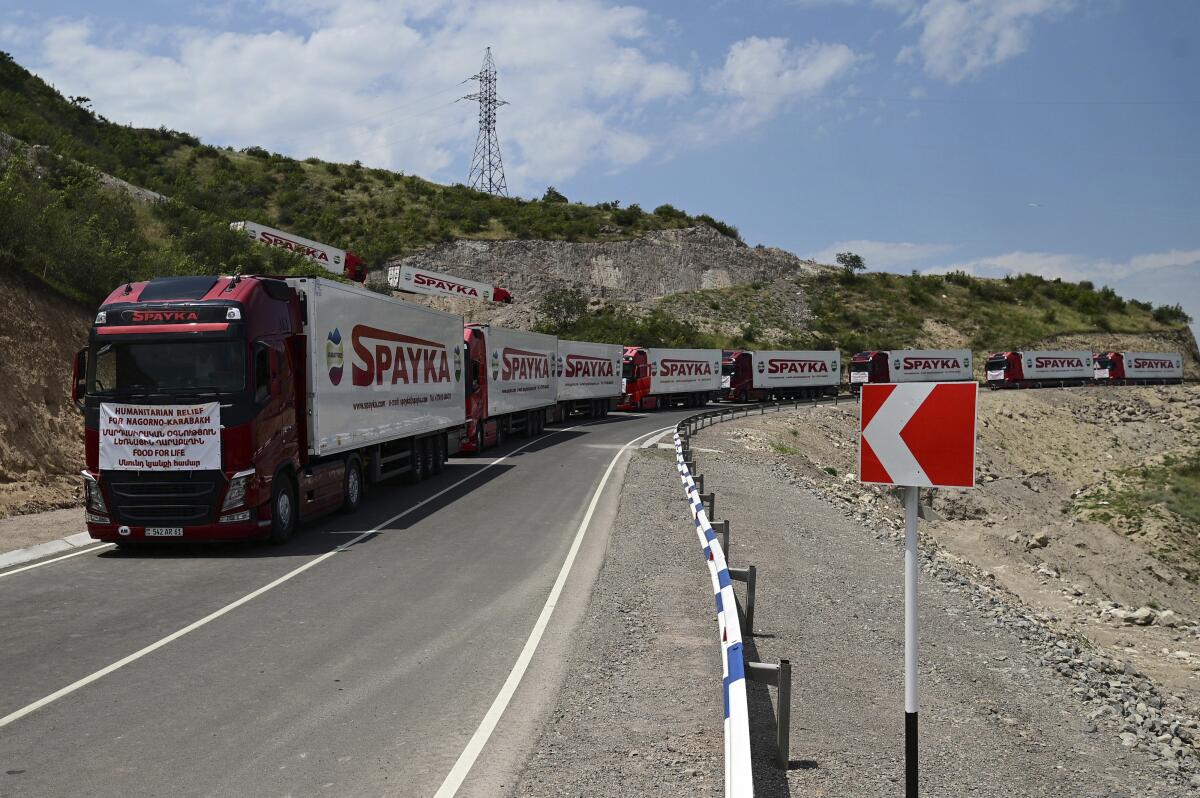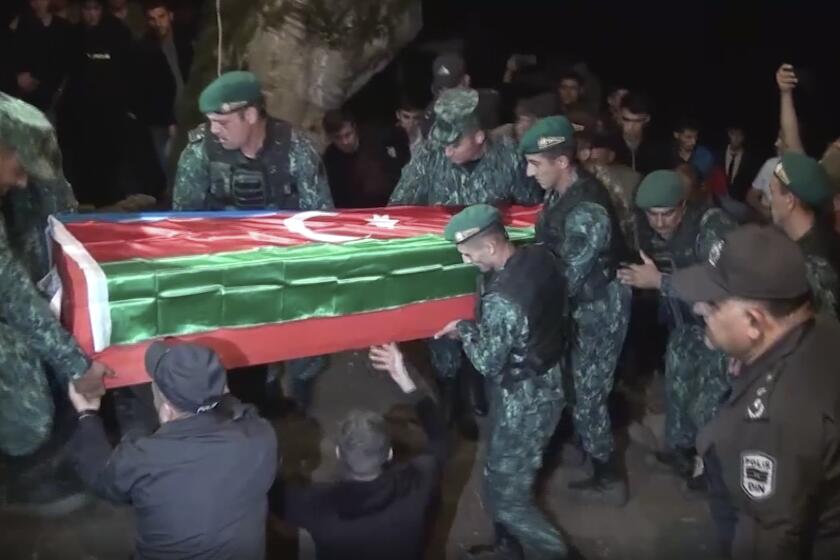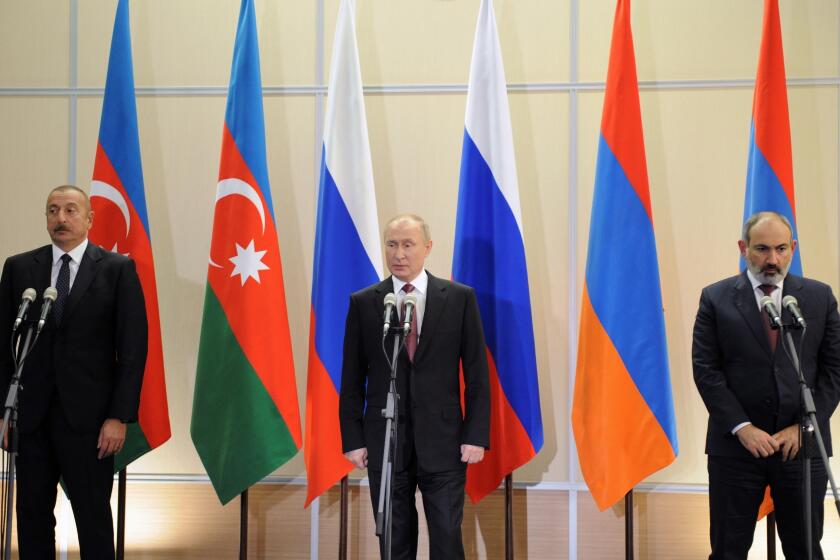Opinion: Armenians are starving at Azerbaijan’s hands. Why isn’t Biden doing more to help?

- Share via
Last year on World Food Day, President Biden reaffirmed his commitment to a world where “no child has to go to bed hungry, no parent has to worry about how to feed their family, and no one has to face food insecurity.” In that same speech, Biden highlighted how the United States had that year alone committed more than $9 billion in lifesaving humanitarian assistance to vulnerable communities around the world.
Sadly, Biden’s pledge is not reaching the Armenians living in Nagorno-Karabakh, who have been locked in a conflict over their homeland with Azerbaijan since the fall of the Soviet Union.
In this latest chapter, since last December the government of Azerbaijan, under the leadership of its petro-dictator Ilham Aliyev, has implemented an illegal blockade of the only road linking more than 120,000 Armenians, including 30,000 children, in Nagorno-Karabakh to the outside world. It is one of the world’s most overlooked and underreported humanitarian crises taking place today.
The disputed Nagorno-Karabakh region pits the two former Soviet republics as alliances with Russia and the West shift.
By limiting access to food, medicine, gas, electricity and other critical supplies to be delivered by the Lachin Corridor, Azerbaijan is on its way to making living conditions so unbearable that Armenians are forced to leave the region.
Earlier this month, a 40-year-old resident of Stepanakert, the capital of Nagorno-Karabakh, died of starvation, becoming the region’s first reported victim of chronic malnutrition and protein deficiency. The lack of food has also contributed to the number of early-stage miscarriages, which reportedly have nearly tripled this summer.
Using food as a weapon has become a popular tool for autocrats to disrupt the lives of innocent people while trying to force concessions that benefit their interests. Russia’s Vladimir Putin has effectively held the global food supply hostage by attacking Ukraine’s ports and crippling grain exports via the Black Sea, as together the two countries export 30% of the world’s wheat, 60% of the world’s sunflower oil and 20% of the world’s corn.
Azerbaijan is turning to a similar playbook in trying to force its will on the Armenian people by attempting to break their spirit and resolve through food. Biden has steadfastly held Russia accountable for its egregious behavior, and the State Department has been working with European Union officials to attempt to reopen the Lachin Corridor. But those efforts have so far failed.
The lack of leadership from the White House has led other actors on the world stage to fill that void. This month, Luis Moreno Ocampo, former chief prosecutor of the International Criminal Court, released an explosive report stating that when assessing the Azerbaijani blockade of Nagorno-Karabakh, “there is a reasonable basis to believe that a genocide is being committed.” And, the report states, “Without immediate dramatic change, this group of Armenians will be destroyed in a few weeks.”
Days before invading Ukraine, Putin signed an agreement with Azerbaijan that set the stage for a humanitarian crisis.
Having been victims of genocide in the 20th century, Armenians know all too well the horrors of such crimes against humanity and feel their voices and concerns are once again being ignored and sacrificed at the altar of realpolitik.
That type of international gamesmanship was evident at the United Nations earlier this month when the Security Council held an emergency meeting to discuss the worsening humanitarian situation after Armenia urged the global community to help end the blockade. While France and other countries used the opportunity to highlight the principles of international law and humanitarianism as reasons to lift the blockade, other delegations — such as Great Britain, which has significant oil investments in the country — held back on condemning Azerbaijan.
And despite the evidence on the ground, Azerbaijan’s U.N. representative claimed that Armenians in Nagorno-Karabakh were happy and well-fed by sharing printouts of Instagram posts that allegedly showed Armenians getting married and celebrating birthdays.
For Biden, as a president who took office claiming that human rights would be central to his foreign policy, this tragedy threatens to stain his legacy.
So, what can he do? For starters, he can begin by unequivocally calling for an immediate end to the blockade and apply pressure on Azerbaijan through sanctions, as Rep. Adam B. Schiff (D-Burbank) has called for. He can enforce Section 907 of the Freedom Support Act that bans U.S. aid to the Azerbaijani government — restrictions that he, like presidents before him, has waived each year since becoming president. And he can direct Samantha Power, the administrator of the United States Agency for International Development, to allocate more resources and money toward helping Armenians in Nagorno-Karabakh.
The U.S. enabling of Azerbaijan’s authoritarianism is now costing lives and giving Azerbaijan cover to do what it wants with impunity. Time is running out for the Armenian people living in Nagorno-Karabakh. If Biden truly believes that no child should go to sleep hungry, then he’ll need to act with far greater urgency to break Azerbaijan’s blockade.
Stephan Pechdimaldji is a communications strategist living in the San Francisco Bay Area. He is a first-generation Armenian American and grandson of survivors of the Armenian genocide.
More to Read
A cure for the common opinion
Get thought-provoking perspectives with our weekly newsletter.
You may occasionally receive promotional content from the Los Angeles Times.












